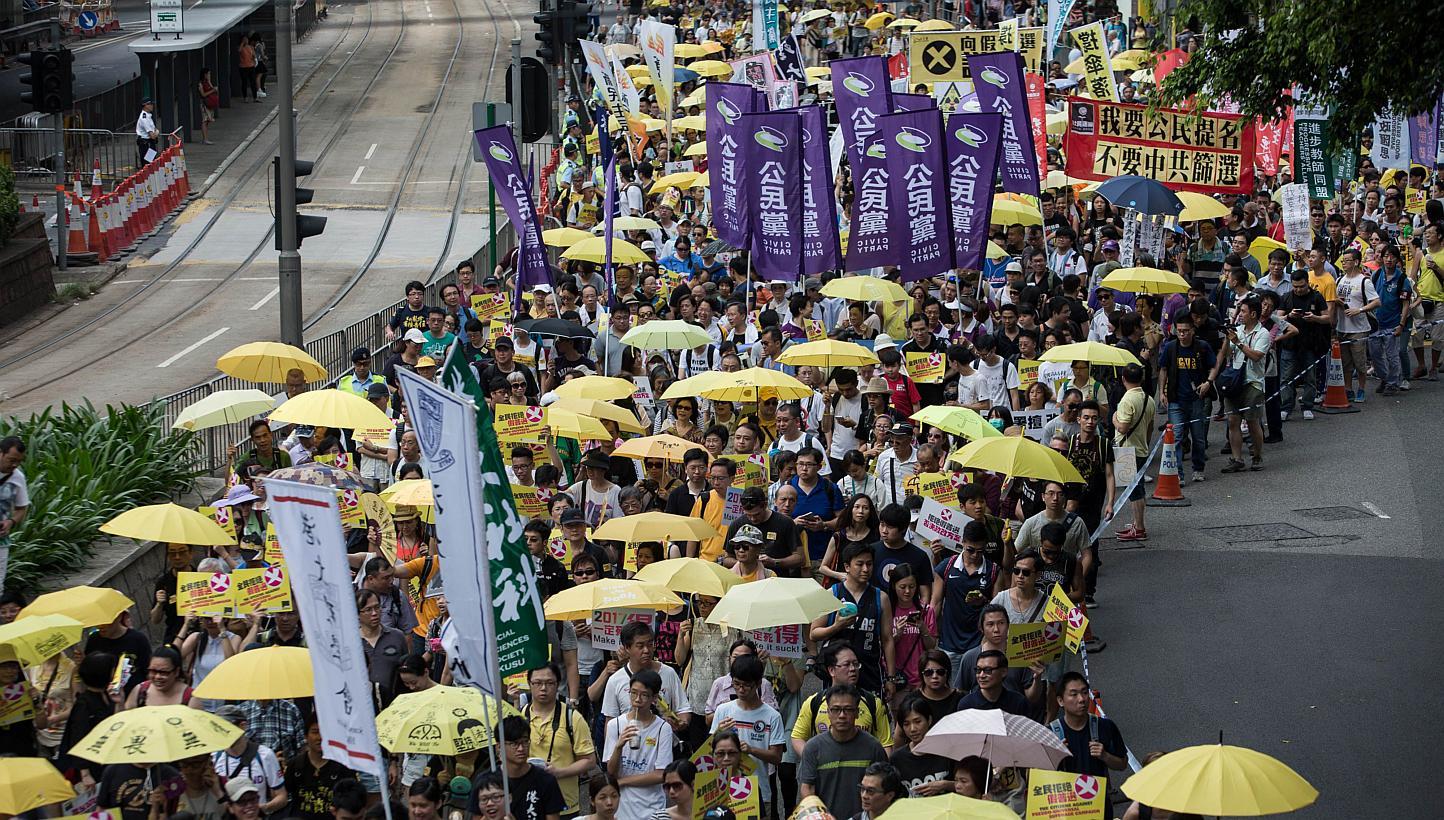Hong Kong pro-democracy groups take to the streets, but in smaller numbers than expected
Sign up now: Get insights on Asia's fast-moving developments

People marching during a pro-democracy rally in Hong Kong on June 14, 2015. The turnout is smaller than expected. -- PHOTO: AFP
Follow topic:
HONG KONG (AFP) - Pro-democracy campaigners took to the streets of Hong Kong on Sunday, but in far smaller numbers than expected, before a vote on a political reform package that has divided the city and sparked mass protests.
Around 3,500 people joined the march through central Hong Kong from Victoria Park to the legislative council building, organisers said.
With temperatures soaring to 30 deg C and humidity at almost 80 per cent, numbers were well below organisers' hopes as the march began. They had said they expected 50,000 to join.
The rally ended in the early evening, more than an hour before the scheduled finish.
Sunday's gathering is the first of a series of rallies which activists say will take place each day until lawmakers vote on the Bill.
Despite fragmentation in the pro-democracy camp, all the key players from last year's protests, which became known as the Umbrella Movement, are set to take part.
"Vetoing (the Bill) is not something to be happy about," said Labour Party lawmaker Lee Cheuk Yan, addressing the crowd on Sunday.
"It shows Hong Kong people have the courage to veto the rotten proposal, but it doesn't mean we have won."
Latest figures from one joint university poll showed those against the reform package taking the lead for the first time with 43 per cent, versus 41.7 in support.
"People may feel exhausted and directionless, but... we need to fight on to get back our Hong Kong, and our basic political rights," added Mr Johnson Yeung of Civil Human Rights Front, which organised the march.
Marchers held placards demanding "true universal suffrage" and yellow umbrellas, symbol of the pro-democracy movement.
"Coming out is an expression of our stance. There is nothing else we can do other than this," said Mr Lam Sum-shing, 73.
The authorities have warned activists to distance themselves from "troublemakers" and said they have heightened security at the government complex.
Police cleared what they called "dangerous objects" including bottles and wooden planks from a small protest camp outside the legislature on Saturday (June 13).
The controversial electoral roadmap, which lays out how Hong Kong's next leader should be chosen, goes for debate at the legislature on Wednesday (June 17) and will be voted on by the end of the week.
It is the culmination of a fraught chapter which saw tens of thousands of pro-democracy protesters bring parts of the city to a standstill late last year.
Those rallies were sparked by a ruling from Beijing that candidates in the city's first-ever public vote for its leader in 2017 must be vetted.
Pro-democracy lawmakers in the semi-autonomous Chinese city have vowed to vote down the election package, which sticks to Beijing's ruling.
Currently the chief executive is elected by a 1,200-strong pro-Beijing committee.
Last year's mass protests saw sporadic violence, with thousands joining the demonstrations after police fired tear gas.
With the reform package expected to be blocked by pan-democrats, who have enough votes to stop it, analysts say there is little hope of a quick resolution to the political impasse.
"If the Beijing and Hong Kong governments continue to adopt hostile attitudes towards the opposition, it will be difficult for them to change the situation," said Dr Ma Ngok, associate professor at Chinese University's department of government and public administration.
There is also pressure on the democracy movement, said Dr Ma.
"What they can do to bring genuine democracy is a challenging question for them." Hong Kong's deputy leader Carrie Lam appealed on Sunday to lawmakers to pass the Bill.
"They should take into account the broad and long-term interest of Hong Kong and change their mind," she told reporters.
Hong Kong, which was handed back to China by Britain in 1997, has much greater freedoms than the mainland but there are fears that these are being eroded.

